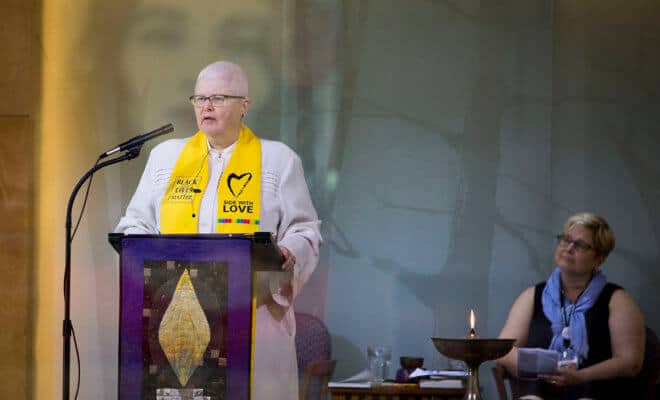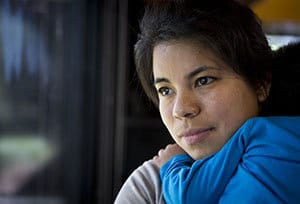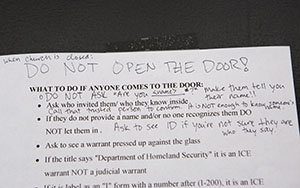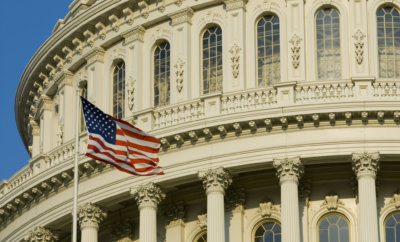Immigration
When The Church Makes An Offering

The Rev. Jeanne Pupke, the church's senior minister, gives a sermon last month titled "Living Into Sanctuary."
Photo: Julia Rendleman for The Washington Post
With the Trump administration staking out an especially hard line against immigrants, a growing group of Virginia churches is taking matters into its own hands.
Of course the urgent call came at night and when the senior minister was out of town: A local woman was going to be deported the next morning unless First Unitarian Universalist Church in Richmond, Virginia, could give her sanctuary.
Congregation leaders got on a video conference with the senior pastor. It was a big step, defying federal authorities. But Abbie Arevalo-Herrera feared for her life if she were sent back to Honduras, where she had been abused by the father of one of her children.
So the church members, who had spent six months deliberating whether to become a sanctuary for immigrants, decided to shelter Arevalo-Herrera and her two young children. The family arrived shortly after midnight on June 20 and has taken up residence in the church basement.
“This isn’t a political statement,” said senior minister Jeanne Pupke, who cut short a conference to get back to Richmond. “It’s a human statement that we’re all called to uphold human dignity.”
The issue of sanctuary for undocumented immigrants has been politically fraught in Virginia. There are no “sanctuary cities” in the state, but the topic laced last year’s elections for governor and House of Delegates and has already come up in this year’s race for U.S. Senate, with Republican candidate Corey Stewart promising to “end the scourge of illegal aliens.”
With the Trump administration staking out an especially hard line against immigrants, a growing group of Virginia churches is taking matters into its own hands. Fifteen houses of worship have joined the Central Virginia Sanctuary Network and pledged to support the effort to create sanctuaries for immigrants. Three more have taken the extra step of preparing to house those seeking to avoid deportation.
Two are in Charlottesville – an Episcopal church and a Quaker meeting house. For the Quakers, last year’s racial violence in Charlottesville interrupted a long, methodical discussion of whether to take action regarding immigrants.
“It was a watershed moment at which we really felt called to do something and to act rather decisively,” said Isaac May, a graduate student and spokesman for the group.

Abbie Arevalo-Herrera holds her son at the First Unitarian Universalist Church in Richmond, where she has taken sanctuary from deportation. She sought asylum in the United States after being threatened by the father of one of her children.
The houses of worship joining the movement include a synagogue and many Christian denominations – Presbyterian, Baptist and Methodist among them. Organizers are working to add more in light of recent news about families being separated at the border and facing harsh treatment.
“What if we could get 100 churches to consider themselves sanctuaries? What is the message that goes back to [the Trump administration], that the uprising is in the churches?” Pupke said.
Her church appears to be the first in the state to actually provide sanctuary to an immigrant family, joining about 40 other churches doing the same nationwide.
Pupke’s congregation was particularly motivated by the recent announcement from Attorney General Jeff Sessions that domestic violence will no longer count as cause for taking refuge in this country.
“Does Mr. Sessions intend to disregard domestic violence, which is a concern for all people and weighted heavily against women? Does he intend for them to be disregarded?” Pupke said.
The church’s action drew attention from politicians. Both of Virginia’s U.S. senators, Mark Warner, D, and Tim Kaine, D, have requested that immigration authorities put Arevalo-Herrera’s deportation order on hold while she appeals her residency case. Kaine is being challenged for reelection by Stewart.
Gov. Ralph Northam, D, praised the congregation. “All Virginians should be proud that our fellow residents have stepped forward at a time when the federal government has not,” he said via email. “This woman fled her country because she feared her ex-husband would kill her if she stayed. The Trump administration’s decision to stop granting asylum to victims of domestic violence and close this nation to her, and people like her, violates the values upon which our nation was founded.”
Church members say they believe that they are not violating any laws. They have been open about their efforts, and held a news conference the day Arevalo-Herrera arrived. Not only is there a long international tradition of churches being respected as sanctuaries, there is also a 2011 memo from the Department of Homeland Security recognizing churches as “sensitive locations” where immigration officers are not likely to conduct raids.
Also on that list are schools and health-care facilities. “Enforcement actions may occur at sensitive locations in limited circumstances, but will generally be avoided,” the U.S. Immigration and Customs Enforcement agency says on its website.
Just in case, church members are taking shifts around the clock, watching doors and windows so that there are no surprises and that the church isn’t vandalized by anyone who opposes sheltering Arevalo-Herrera.
“That’s the key thing – we want Abbie and her family to be safe,” said Paul Dolci, 69, a retiree and church member who had volunteered for a shift and was pacing the church lobby one recent afternoon.
About a week after taking refuge there, Arevalo-Herrera, 30, was still settling in to her strange new home. “That night I made a choice that I didn’t know if it was the correct one,” Arevalo-Herrera said through an interpreter. “But I had to do it to be safe and to be close to my family. I just thank the people that were here.”
She came to this country in 2013 to escape an abusive relationship with a man she feared might kill her, she said. She left an infant daughter with her mother, believing that she was too young to make the trip, but brought another daughter with her.
Now married to a legal U.S. resident, Arevalo-Herrera has her 11-year-old daughter with her in the church, along with a 2-year-old son who was born in the United States.
Arevalo-Herrera is appealing a federal immigration judge’s ruling that she is in the country illegally. Usually, immigrants can remain in the United States while their case is under appeal, said Alina Kilpatrick, a lawyer working with Arevalo-Herrera. But last week, Arevalo-Herrera was told she was being deported to Honduras immediately.

A sign on the door at the First Unitarian Universalist Church in Richmond, Virginia, which has offered sanctuary to a Honduran woman. Photo by Julia Rendleman for The Washington Post
Kilpatrick doesn’t know whether the deportation order was connected to Sessions’ decision last month not to recognize most domestic abuse as grounds for asylum, but noted the timing. “Before the Sessions decision, she was allowed to let [her appeal] ride. After the Sessions decision, she was not. And there is no intervening circumstance . . . that would warrant a change,” Kilpatrick said.
The lawyer put an air mattress in a church meeting room and stayed there for more than a week after Arevalo-Herrera arrived.
An official with ICE said that Arevalo-Herrera was first ordered out of the country in 2015 and that several appeals or requests for a “stay of removal” have been denied. An appeal with the Board of Immigration Appeals is still pending, the official said.
As her two children spend time with donated books and toys, Arevalo-Herrera said she tries to keep her mind off things by taking care of the kids and cooking for them.
But she can’t avoid thinking about what might await her in Honduras. “Many women come to this country with the hope that we can be protected because our governments cannot do it,” she said, through the interpreter. Her plan now, she said, is “faith. Faith that the government of this country is going to change their ideas about us.”
Worshipers at the church, who spent half of last year carefully considering whether to step into the immigration debate – and even turned away three requests for asylum before Arevalo-Herrera’s – say they now feel compelled to add action to their faith.
“It’s kind of shame on us that we haven’t been having these conversations earlier,” said Sharon Amoss, a manager at a nonprofit who serves as president of the congregation. “But the current environment makes it impossible to ignore them any longer. It’s just become so much more overtly hostile to immigrants and people of color and really anyone with any difference.”
(c) 2018, The Washington Post




You must be logged in to post a comment Login